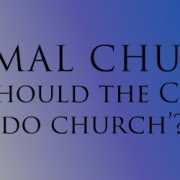I have no wisdom to share, no hobby horse to ride, no burning coal of encouragement or rebuke. Rather, I have a question that I admit I have no answer to. This is not a Rob Bell-esque attempt to stir things up by posing a question and pretending I have no opinion on the matter while secretly pursuing an end. I truly want to know more about something, and hope that those who read, comment, and lurk on this blog will jump in and share their Biblically educated thoughts that I may be further enlightened; that we all may.
Does God reveal a specific design in Scripture for what the Church should look like? To this I say “yes”. I actually could write a post on that: the Biblical description of who the Church is, our position, our calling, our purpose. But that’s not the question I’m curious about.
I’m wondering if God reveals specifically how the Church should worship, meet, pray, and go about being and doing those things we know that Scripture calls the Church to be and do. Was it intended to be the same for all time, or to change and adapt? Have we ever done it right? What is “normal church” supposed to be? Are the guidelines loose enough to allow for many different cultural expressions of “doing church”? I hope I haven’t muddied the water in trying to ask the question. Let me get really specific.
It’s clear from the Biblical record of the Acts of the Apostles that the earliest gatherings of the local Church bodies met in homes, open-air locations, and other convenient places held by members of the body of Christ. We see the earliest church praying together daily, and sharing their resources for the common good of the body of Christ. This was in Jerusalem. But we also see small glimpses into the lives of local Church bodies in Antioch, in Asia, in Greece. We see the weekly “love feast”, the sending out of missionaries, the appointing of elders and deacons. The call to teach and shepherd and discipline the Church.
As stated above I don’t have definite answers to all my questions, but from what I have studied it seems that the Church meeting together in “church” buildings didn’t begin until the mid 3rd century. Now it’s considered “normal” and even required by some groups. In fact, when I affiliated as a Calvary Chapel pastor it was a requirement that the local Church body I was pastoring met in an official building of some sort and specifically on Sunday. And yet the Church grew and thrived for over 200 years in homes, open spaces, and other properties they had access to through members of the Body. Was this God’s plan all along? To build up His Church in these places until the day when legal ownership of their own building would be possible, and then that would become the new “normal”?
Was it God’s plan that the individual members of His Body would meet together daily until such a time as they were able to get by with Sunday mornings and maybe a mid-week meeting? Is the bi-weekly meeting God’s plan for the new “normal”?
Was it God’s plan for His Church to share things in common and send aid to other local Church bodies in desperate need until they became big enough to have so many of their own issues that they need only worry about themselves? Was this His design for the new “normal”?
The Church in Jerusalem met daily. The Church in Corinth had love feasts and communion on Sundays. Was it His plan for those things to be temporary until we figured out a better way that would become the new “normal”?
Is our “normal” of today (and the last several centuries) just as flexible as the “normal” recorded in Acts? Or is our normal the end all? How can a pastor or elder have confidence that they are leading His Church in a way that He intended? In other words… how do we KNOW that a Sunday morning service with 30 minutes of singing/music/worship, followed by 30-60 minutes of expositional teaching, the collection of offerings, announcements, and maybe a potluck is how God truly intends for His Church to accomplish the mission of making disciples throughout the world? Or is it simply one of many ways?
Please don’t turn on the assumption afterburners and think that because I’m asking the questions I’m against these things or being contrary for the sake of stirring up conversation. I’m not entertaining some kind of dangerous doubt, or loosing the faith. If we can’t question and reaffirm why we do what we do in the name of Christ then we have no business claiming to do it in His name!
So, are these things done the way that we do them because God revealed that His Church should do them thusly? Or are they our interpretations of BIble and history and custom, tailored over time, institutionalised, and made comfortable via the vehicle of cultural adaptation?
If God never intended for there to be a specific Biblically mandated liturgy (beyond baptism and communion and the making of disciples throughout the world), then I’m okay with that. In fact it’s quite freeing to know that we can truly be lead by the Spirit within the bounds of common sense, cultural compatibility, and Biblical principles to carry out the work and ministry of the local Church body in the way He leads.
But if God gave us a specific design then what is it? If it’s what we see in the early church, then where in Scripture is it taught and why don’t we still do it that way? Why would a movement that typically decries the influence of Constantine’s legalisation of the Christian faith as “marriage to the world” then also cling to one of the chief results: the Church owning property and meeting in official buildings of worship rather than believers’ homes and other properties and open spaces in the community? Why was communalism okay then, but so heavily guarded against, and even sneered at now? Why was daily prayer and worship normal then, but beyond even the ability to imagine now (because people are busy with “their own lives”)?
If it’s what we see in the “normal” of today then where in Scripture is it taught and why didn’t the early church figure it out?
Or is it that those things were never normal and we’ve just misunderstood the record?
Or maybe they truly weren’t intended to remain “normal”, and the bi-weekly meetings of busy Body members with little to no real knowledge of each other and love of one another was always God’s goal? (Okay, I admit that one was opinion and a bit of bitterness masked in the facade of a question).
The thing is, it’s not normal in other places I’ve lived and spent time in. It’s not normal in many places I’ve heard from others about. What should the daily life and liturgy of the Church look like? Who got it right? The early Church? The African Church? The Indian Church? The Western Church? The Catholic Church? The Orthodox Church? The Chinese underground Church? Or is there a “normal” or “right” way at all, other than just doing what is truly Spirit lead and best for the Body of Christ in each local Church body?
I know… lots of questions. Let’s here some of your answers. I’m really very curious and hope that many comment and share what they’ve learned from Scripture, prayer, research, and experience.
Thanks!





 The goal of the gathering is to create a community built around like-minded people being kind towards and helping one another. The space where they are meeting is even an old church (left). So what makes a church?
The goal of the gathering is to create a community built around like-minded people being kind towards and helping one another. The space where they are meeting is even an old church (left). So what makes a church?



